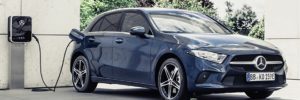
Mercedes-Benz has ended its development of fuel cell-powered passenger cars, saying that they would be too expensive—around double the cost to produce of comparable battery-electric vehicles. The company has been working on fuel cell technology for over 30 years.
Mercedes says it will wind down production of the GLC F-Cell, which was developed in a 2013 collaboration with Ford and Nissan. Mercedes was the only automaker of the three partners to produce a vehicle under the program. It built a few hundred units of the GLC F-Cell, and provided them to business partners and a few fleet operators, but never offered the model for sale to the public.
Other automakers have also recently retreated from fuel cell development. Last November, Honda said it would put fuel cell vehicles on a back burner (and phase out diesels). In March, Volkswagen explained in detail why it decided that batteries are a superior solution for passenger cars.
BMW, Hyundai, and Toyota continue to pursue fuel cell vehicles.
Even as automakers abandon hydrogen as a storage medium for passenger cars, many clean energy advocates argue that the technology may have a role to play: in industrial processes; as a propellant for ocean-going ships; and possibly for heavy-duty long-haul trucks. In fact, Daimler recently formed a new joint venture with Volvo for “development and large-scale production of fuel cells for applications in heavy-duty vehicles and other use cases.”
source https://chargedevs.com/newswire/daimler-becomes-the-latest-automaker-to-abandon-hydrogen-powered-passenger-cars/
No comments:
Post a Comment